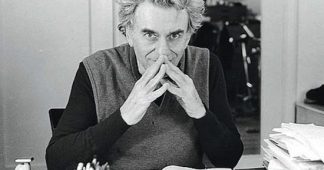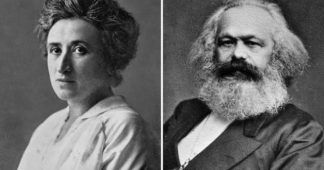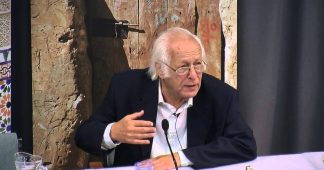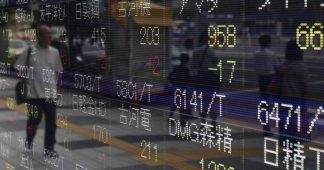We reproduce here a quite interesting synthesis on the work of Ernest Mandel, one of the great Marxist economists of the 2Oth Century, although we disagree with some of the points adopted by the writer. For instance, we doubt very much that Mandel would characterize modern China as a capitalist country, if he was alive.
Mandel and Capitalist Breakdown
Using insights from Belgian Marxist thinker Ernest Mandel, economist George Kerevan argues capitalism will suffer profound breakdown this century.
It is now 25 years since the death of Ernest Mandel (1923-1995), one of the 20th century’s most engaging and original economists. Economics is not everyone’s cup of tea. The Scots philosopher Thomas Carlyle christened it the “dismal science” – and that was before the discipline was poisoned by abstruse mathematical models. Besides, the track record of modern economists in predicting impending financial catastrophe is hardly good. So what makes Ernest Mandel worth remembering?
For starters, Mandel, a Marxist, had a better track record of economic prediction than most economists – with insights still valid today, as we’ll see below. He was also the antithesis of the rarefied, bourgeois academic. A Jewish resistance fighter against the Nazis in his Belgian homeland, Ernest was arrested and escaped three times. In the 50s, he was an important influence in the Belgian trades union movement. In the early 60s, Mandel was in Cuba working with Che Guevara on economic planning. He happily donated his own upturned car as a street barricade to fend off CRS stormtroopers, during the May ‘68 uprising in Paris. Yet Ernest was also a charming, non-dogmatic personality – as I found in the 1970s, when showing him around Edinburgh.
Above all, Mandel was an Enlightenment intellectual polymath. He lectured and wrote about political economy in a bewildering (sometimes intermingled) host of languages yet was always effortlessly intelligible and fascinating. In an absurdly crowded life, he published 30 books and some 2,000 often technical articles – in German, Dutch, French, and English. One of these books was actually a political history of the crime novel, a genre to which he was addicted. Po-faced colleagues on the British New Left Review journal were aghast at this “lapse”, but Ernest just smiled his perpetual, mischievous smile.
Ernest Mandel was no closet academic but a committed anti-capitalist. In fact, his path into academia proper was delayed by the small matter of his being banned – at one time or another – from entering a variety of Western democracies, including France, the United States, Australia, and Switzerland. The refusal of the Nixon administration to let Mandel into the US to lecture at Stanford University (and debate Kennedy’s pet economist, John Kenneth Galbraith) was appealed all the way to the Supreme Court.
Late Capitalism
Mandel had committed the cardinal sin of being not only a Marxist but one who could wield his Marxism intellectually (and to great effect) against existing economic orthodoxy. Famously, he predicted the collapse of the post-war economic boom at a time when conventional bourgeois economists were fantasising that growth and full employment would last forever, thanks to state intervention. Mandel’s magnum opus, entitled Late Capitalism, was written just before the 1974-75 global slump, the first synchronised recession since the 30s and bellwether of the arrival of the age of neoliberalism.
Late Capitalism is a 600-page, forensic analysis of the mechanics of the Keynesian era of 1940-1975, artfully predicting that government deficit spending and the permanent arms economy were not enough to delay a generalised global crisis. Mandel was one of the few theorists to grasp that Keynesian deficit spending and high welfare expenditures meant high taxes, and that this would eventually squeeze profits to the point where capitalists revolted. He foresaw this would mean an assault on the welfare state compact that existed in most Western democracies, an assault eventually ushered in by Reagan and Thatcher.
Note here that Mandel was not predicting economic breakdown in some mechanistic fashion, similar to the vulgar propagandism of some on the socialist left (including the old Militant Tendency and its leader Ted Grant, who forecast the immediate collapse of capitalism on an annual basis). Rather, Mandel was trying to identify the play of contemporary economic and class forces in real time. For instance, in a prescient chapter of The Second Slump (1977), entitled ‘Industrial Contraction, Financial Panic’, Mandel identified a new seam of instability in global banking that would have fatal consequences decades later in the 2008 crash.
He notes that big corporations are increasingly able to borrow from the banking system while simultaneously obfuscating their accounts (think Enron, Carillion, and sub-prime mortgage lenders). Unfortunately, Mandel points out, “the competence of top bank officials…inevitably declines as recruitment speeds up” while “the atmosphere of sharpened competition prevailing among banks frequently impels them to take greater risks…”. He also identified a shift towards central banks underwriting this reckless lending, opening up the prospect of a cycle of increasingly dangerous financial crises (sadly, this was a promising theme he failed to develop in later years – a fault shared by most Marxist economists around the end of the 20th century).
Mandel’s Method
The crux of Mandel’s method was to use Marxist economic categories to analyse current problems, illuminated with contemporary data rather than filial quotes from Das Kapital. The first example of this approach was Mandel’s widely published Marxist Economic Theory, written in the 1950s when he was editor of the Belgian Socialist Party newspaper La Gauche. In this work, he broke new ground by reconstructing Marxian economics through a critical engagement with post-war pro-capitalist economists and sociologists – a full-frontal ideological offensive against the academic citadel of bourgeois theory. As a result, Marxist Economic Theory had an impact well beyond Mandel’s tiny Trotskyist circle, including radical movements in both North and South America. Significantly, bourgeois academics were forced to respond. Robert Heilbroner, a doyen of US mainstream economics, gave Mandel’s book a critical yet highly complimentary examination in the New York Review of Books, calling the publication of the American edition “an event of great importance”.
Mandel’s restatement of Marxist economics broke with the mechanical determinism that had infected interpretations of Das Kapital among Stalinists, left social democrats and orthodox Trotskyists alike. He went back to Marx’s original insight that the system is determined by an interplay of real forces. These interact dialectically, that is the various magnitudes and tendencies change each other when they interact. As a result, and like Marx, Mandel eschewed mono-causal explanations of capitalist instability and breakdown. Unlike some, he reaffirmed Marx’s conclusion that the capitalist economic system is indeed entropic and subject to existential disruption because of the internal inconsistencies exhibited by the contending forces on which it is based.
To be critical, the method employed by Mandel can seem a trifle eclectic. Anglo-Saxon empiricism craves the simplicities of a mono-causal explanation of a crisis. Alas, the material world – especially the dense thicket of social relations that define a capitalist economy – is always multi-various, multi-faceted, multi-connected, and multi-directional. Making sense of the meta-phenomenon that is a mode of production requires concrete analysis in real time. What Marx provided (and Mandel revived and modernised) is a set of conceptual tools to describe the precise economic relationships and forces at work in a specifically capitalist system. For Marx and Mandel, the interplay of these relationships and forces is never random. Rather it is governed by identifiable tendencies, aka “economic laws”.
Long Waves
In particular, Mandel revived and embellished the idea of “long waves” of capitalist expansion and contraction, first identified by the Soviet statistician Nikolai Kondratiev (shot by the NKVD in 1938). Capitalist instability exhibits itself in periodic booms and slumps. But Kondratiev noticed a longer pulse of roughly 25-30 years expansion, in which investment in new technology triggered an increase in capital accumulation. This was followed by a similar downswing of 25-30 years, when profits slump and economic growth slows. Mandel went beyond Kondratiev’s empirical studies to theorise the forces creating such generational economic pulses. At root, Mandel’s fascination with the phenomenon of long waves represents an attempt to explain the prolonged existence of capitalism through the 20th century – a longevity persisting far beyond what the founding fathers or Lenin’s generation could ever have imagined.
Mandel’s chief concern was the totally unexpected (even by pro-capitalist economists) upswing during the period 1940-1965 – sometimes 1945-1970. Clearly there was a “long boom” in these decades, characterised by massive new investment in cars, consumer white goods, television, leisure and travel, automated machine tools and calculating devices, aircraft, atomic science, early computers, energy, and defence technology. On the class front, a massive expansion of the organised American and European industrial proletariat forced massive wage concessions, but these were affordable in the short term as a result of huge productivity and output gains. The detonation of this cycle Mandel located in the supercharged rise in the rate of exploitation (aka increasing relative surplus value) of the working class introduced by fascism allied to the wholesale physical destruction of existing fixed capital during WW2. Mandel characterised this new period – somewhat inadequately – as “neo-capitalism” or “late capitalism”.
Within this framework, Mandel identified an important ancillary role played by competition between the triad of the US, the Common Market (later EU) and Japan. Europe formed the Common Market to shield itself from foreign competition while embarking on a massive capital investment programme exploiting the cheap labour of German, French and Italian peasant farmers driven from the land by the Common Agricultural Policy. Japan followed very much the same route. Result: by the start of the 60s, the US was under intense competition from Europe and Japan. The Kennedy administration responded by cutting taxes and promoting a massive wave of investment in new technology, in a bid to counter this reborn Franco-German and Japanese capitalism. Mandel was a long-time opponent of the Common Market and EU, seeing it for what it was – and still is – a front for the interests of European big business and finance capital.
What causes Economic Crises?
It’s important to note that Mandel never relies on the intense competition between the post-war imperialisms as being the primary or exogenous explanation for the global over-investment and declining profit rates that broke the post-war boom – it is merely one factor to take into account. Instead, he sees crisis already built structurally into the system, as the very act of excessive global capital accumulation reduces the average rate of profit, till the extra productivity (relative surplus value) squeezed out of the global proletariat from new technical investments proves insufficient to pay their cost, and the system goes into stasis despite the cornucopia of extra goods being pumped out. The precise trigger for the moment of over-accumulation varies historically, but regardless, it is more the straw breaking the camel’s back than the prime mover. In this, Mandel remains a classical Marxist.
In opposition to Mandel, the noted American Marxist historian Robert Brenner explicitly abandoned Marx’s theory of the falling rate of profit, falling back on a geopolitical model that prioritises inter-imperialist economic competition as a motor force to explain long waves. This is interesting because Brenner has replaced Mandel as the leading economist writing for New Left Review, the British leftist theoretical journal. Brenner accepted the falling rate of profit as an empirical reality but argues it is an effect rather than a cause (see New Left Review I/229). But this lead him into dangerous waters. Specifically, that capitalism has no internal tendency towards entropy, as Marx and Mandel claimed. Instead, Brenner pointed to “the inherent dynamism of the capitalist economy over the long run”. So what caused the down wave after the 70s? The answer had to be accident and conjuncture. Brenner suggested two factors. First, that excessive wage suppression had reduced effective demand too far – but surely a thinking capitalist class can remedy that? Second, that global market over-supply was blocking new investment. But surely this was just another way of saying that profitability had stalled – and stalled because there was already too much investment to earn a necessary return? Which was Marx and Mandel’s point, to start with.
This is not an arcane debating point. We are once more in a period of intensifying global inter-imperialist competition, now with capitalist China added. How will this impact on future capital accumulation? After the post-war “long boom” ended in the 70s, Mandel predicted the next downswing – one we now associate with neoliberalism and globalisation. Unfortunately, he did not live long enough to focus his undoubted capacities on understanding the mechanics of this downswing – one that has produced an outpouring of academic Marxist tomes but little agreement. This intellectual lacuna suggests one weakness in Mandel’s long-wave conceptual apparatus: explaining how these roller-coaster waves relate to Marx’s theory of the ultimate breakdown of capitalism.
At the heart of Marx’s original theoretical framework lies the notion of “zusammenbruch” – the ultimate breakdown of capitalist reproduction through accumulation (though it must be stressed Marx never completed his detailed analysis of these tendencies). Breakdown not in the sense of a single cataclysmic day but rather the cumulative decay and ultimate non-functioning of the system caused by its internal contradictions. Certainly, zusammenbruch has taken its time in arriving, leading some to reject Marx’s economic logic (beginning with his close disciple Eduard Bernstein). The problem with the long-wave theory is that it can be interpreted as justifying the absence of any inherent entropy in the system, despite Mandel’s best intentions. In other words, capitalism trundles on regardless through a series of Houdini-like escapes (think 2009). Who knows but a resilient capitalism may survive well into the 21st century on a tide of green investments (the next investment upswing?) aided by a workforce newly discipled through the precarious gig economy and internet surveillance? In which event – short of a deus ex machina from outwith the system – the revolutionary overthrow of capitalism seems a dim prospect.
But this is not the case. Without for one moment rejecting the conjunctural importance of renewed imperialist competition (which brings the threat of war) or of climate change, it is important to state that global capitalism has entered a terminal phase of its existence, as a result of its own internal economic contradictions. This is just as Mandel predicted (following Marx). The last half century has seen the emergence of a global glut of manufacturing capacity, a subsequent contraction in capital investment rates, followed by a collapse in productivity growth. If anything, the Kondratiev cycle seems to have turned into a permanent downcycle. Both Marx and Mandel predicted such a tendency was inherent in capitalism as a mode of production. They link this entropy to an inherent dynamic in capitalism towards a falling rate of profit which acts as a disincentive to invest.
This is not the place for a detailed technical discussion of how this process works. Suffice to say that in capitalism value is created by exploiting labour power – both in the form of living labour in the office or factory, and in embodied labour in machinery and computers. The available amount of living labour therefore sets a limit to production and capital accumulation. Capitalists constantly try to squeeze extra output from existing labour supplies by investing in technology. Given the biological limit to the working day, it takes an increasing volume of investment in machines to create each increment in value from the living workforce. Hence the downward pressure on the average rate of profit.
This downward pressure on the average profit rate operates at a global, systems level with a resulting negative impact on investment decisions. Individual firms or even individual national economies can continue to expand for a time (e.g. the US hi-tech monopolies). But Mandel warns: “a fraction of newly accumulated capital can no longer be invested at the ‘normally anticipated’ conditions of profitability. This capital is then increasingly directed into speculation…” (The Second Slump, pp 173-175). Hence the financial and bank instability of the past two decades, and the present insane rise in stock exchange prices. Or the uninvested capital is simply consumed by the capitalist class in luxury consumption. There are still absolute monetary profits, of course, but ultimately expected marginal returns become insufficient to fund the historic level of investment in plant and machinery. Increasingly the capitalist class refuses to invest in new technology or spread its use through the entire spectrum of human needs, as opposed to mad speculative schemes such as the present one of building rockets for space tourism. It is like a human body whose organs are shutting down one by one. Thus the only historic mission of capitalism – to boost human productivity – comes to a shuddering halt. In the real world, productivity growth has flat-lined over the past few decades despite the advent of the internet. This is the ultimate proof that capitalism has become a decadent mode of production.
Of course, different industrial sectors develop at different rates across the world. It is obvious in the past three decades that US hi-tech firms have created new markets and reaped monopoly (above average) profits, while other sectors (like cars) have seen profit rates tumble. Overall, the capitalist system has entered its geriatric stage and if we miss this we will be unprepared for the events of the next few decades. Trump’s naked attempt to protect US monopoly profits in hi-tech from Chinese encroachment offers little respite. Companies such as Apple and Microsoft are sitting on cash mountains or buying back shares rather than investing. The global system of capital accumulation for accumulation’s sake is turning itself off for lack of investment opportunities that satisfy its profitability criteria. This is an historic insanity given the threat to humanity from climate change (itself a by-product of capitalist growth). As a result, we are entering a new era of resistance and social revolution that will dominate the rest of the 21st century.
Why Remember Ernest Mandel?
Why remember Ernest Mandel so long after his death? Above all because he presents a massive and sustained intellectual argument against the irrationality of free-market capitalism. But more, he presents the case for an alternative reality. Neoliberalism has tried to corner the market in ideas, essentially claiming no other world order is possible except liberal democracy, private ownership of production, absolute free trade in goods and services, and free movement of capital and labour. The result is actually zero gains in productivity despite new technology; the creation of bogus consumer demand while the southern hemisphere starves and the northern hemisphere dies of obesity; everywhere the lengthening of the working week despite the invention of robots and artificial intelligence that could free human beings from toil; and the rise of authoritarian populism and surveillance capitalism.
How would Ernest Mandel have reacted to this very real dystopia we are all living in? Mandel was often criticised for being “too optimistic” regarding the prospects of overthrowing the capitalist system. Indeed, he was one of the few Marxist thinkers of the contemporary era who allowed himself to sketch out what the post-capitalist future might look like. In particular, he argued incessantly that with the abolition of capitalism it would be possible to introduce a radical reduction in the working week very quickly. For here lies the ultimate absurdity of capitalism: it invents and builds machines to free humans from work, then forces people to work even longer producing commodities solely for the purpose of generating more profit, rather than satisfying needs. Mandel held the conviction that human beings would eventually revolt against such an irrational system. That’s a vision to be optimistic about – even in the darkness of the present crisis.
Published at https://www.conter.co.uk/blog/2020/8/3/mandel-and-capitalist-breakdown











